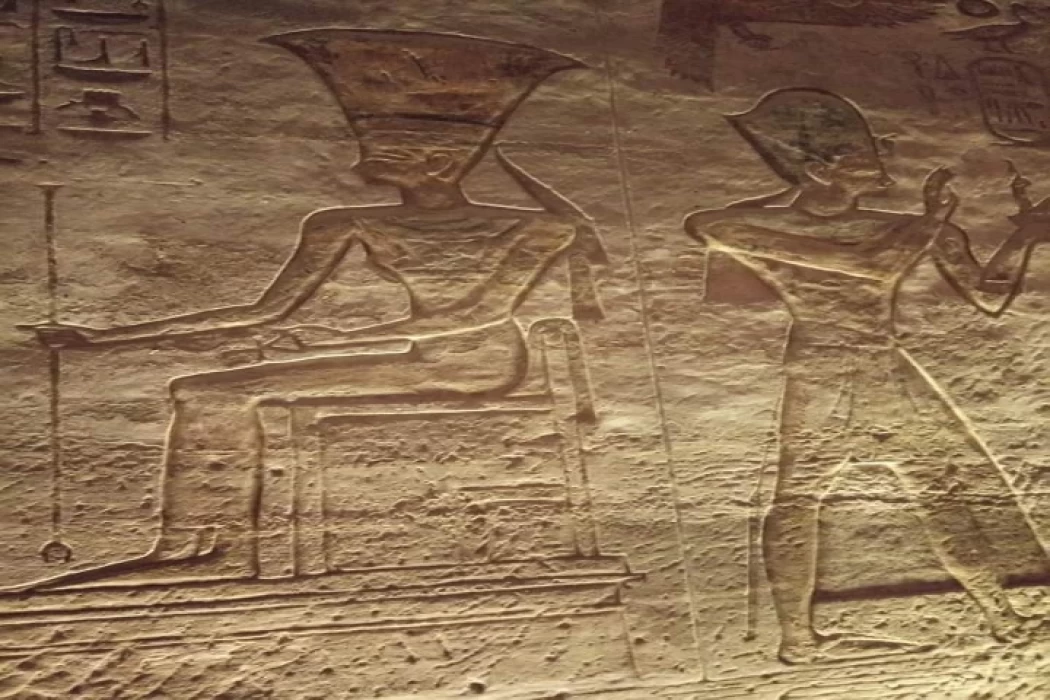
Deusa da Anuket
Anuket (ou Anukis, o seu nome grego) é uma deusa núbia, representada como uma senhora com uma coroa de penas ou canas, com um ceptro, e o conhecido ankh da cultura do Antigo Egipto. O seu nome significa "aquela que abraça", e foi venerada em Sehel e Elefantina.
Perto da primeira catarata do rio Nilo, a partir do Império Médio, foi venerada juntamente com os seus pais, Khnum e Satis, como uma tríade sagrada: a tríade do Elefantino. Antes, porém, foi considerada a filha de Deus Amun Ra.
O animal que a representava era a gazela, o que simbolizava delicadeza e ternura. Neste aspecto, ela foi mostrada como a "mãe do rei", amamentando o faraó como uma figura materna e protectora.
Ela era conhecida como a "governante de Núbia". Era considerada a deusa da luxúria, pois estando associada ao Nilo, representava a fertilização da terra por inundação quando o rio transbordava.
Com o passar do tempo e o encontro de diferentes culturas, ela foi identificada com a deusa Ísis em Dendera e File e foi mesmo ligada a Nephthys mais tarde.
O principal centro de culto de Anukis, como o conhecemos até hoje, era o templo na ilha de Sehel, embora ela fosse venerada em toda a Núbia, em Elefantina, File, Komir, Dendera, e Deir el-Medina.
Todos os anos, a festa que lhe era dedicada realizava-se no 7º dia do mês de Deus Toth. Foi o momento que coincidiu com a inundação do rio Nilo. Nestas festividades, era costume as pessoas partirem como uma oferta de ouro, jóias e objectos preciosos, que eram lançados à água em agradecimento pela fertilidade dos campos.
Parte do costume incluía a gastronomia. Nestes dias, era possível comer certos tipos de peixe que eram proibidos durante o resto do ano.
Escolha seu trio nos Passeios de Luxo pelo Egito e embarque em uma aventura encantadora pela grandiosa história egípcia.
Anuket (or Anukis, her Greek name) is a Nubian goddess, represented as a lady with a crown of feathers or reeds, with a scepter, and the well-known ankh of Ancient Egyptian culture. Her name means "she who embraces", and she was venerated in Sehel and Elephantine.
The animal that represented her was the gazelle, which symbolized delicacy and tenderness. In this aspect, she was shown as the "mother of the king", suckling the pharaoh as a maternal and protective figure.
She was known as the "ruler of Nubia". She was considered the goddess of lust, because being associated with the Nile, she represented the fertilization of the land by flooding when the river overflowed.
The main center of worship of Anukis, as we know it to this day, was the temple on the island of Sehel, although she was venerated throughout Nubia, in Elephantine, File, Komir, Dendera, and Deir el-Medina.
Every year, the feast dedicated to her took place on the 7th day of the month of God Thoth. It was the moment that coincided with the flooding of the Nile River. In these festivities, it was customary for people to leave as an offering gold, jewels, and precious objects, which were thrown into the water in gratitude for the fertility of the fields.
Part of the custom included gastronomy. On these days, it was possible to eat certain types of fish that were forbidden during the rest of the year.
Religious rituals began with the Ankut festival, when the annual Nile floods began. People threw coins, gold, jewelry, and precious gifts into the river, crediting the water with giving life and the benefits of returning the wealth provided by its fertility to the goddess Ankut. Taboos held in several regions of Egypt against the consumption of certain fish, which were considered sacred, were lifted during this period, indicating that Nile fish species were idolized and used as part of major religious festival rituals.
Anuket's Triad at Elephantine
Like her mother, Satet, Anuket was considered the goddess of hunting animals. According to mythology, Anuket was part of the Elephantine Triad.
The ram-headed fertility deity Khnum, the battle goddess Satet from the Nile flood, and their daughter Anuket, the cataract goddess, made up this triad. Elephantine is situated near Aswan, Upper Egypt, which is on the border between Egypt and Nubia. It was a place of worship for the gods named above. There are other Nile arches in Nubia, which is now Sudan.
When the Nile flooded, the waters entered Egypt via Elephantine. History tells us that Anuket's father, Khnum, guarded and controlled the river's waters... By the 18th century, this place had become a center of worship for the three deities.
















